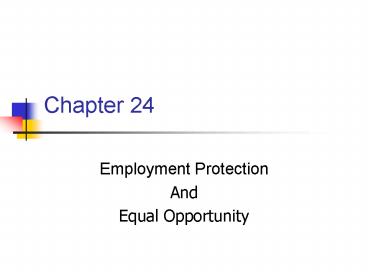Employment Protection PowerPoint PPT Presentation
1 / 29
Title: Employment Protection
1
Chapter 24
- Employment Protection
- And
- Equal Opportunity
2
Laws Regulating Employment Conditions
3
OSHA (Occupational Safety and Health Agency)
- Agency of federal government that sets safety and
health standards for most U.S. companies. - Business with 11 employees
4
Inspections Occur
- Randomly, but must be announced
- When death or disaster occurs
- High Risk Industries
- When there are complaints from Employees
- Must be in writing (laws protect employees)
- Workplace cannot fire whistle blowers
5
Violations Found
- Employers can be fined for each violation found
- If employer recklessly disregards standard, the
fine can be 10,000 per day with a cap of 70,000.
6
Wages, Hours, and Benefits
7
FLSA
- Fair Labor Standards Act
- Minimum Hourly Wage
- Time and ½ for all work past 40 hours
- Employment of minors
8
Equal Pay Act (1963)
- Amendment to FLSA
- States employers engaged in Interstate Commerce
must pay women the same rate as men holding the
same job - Must be same not comparable
9
Employment Retirement Income Security Act (ERISA)
1974
- Pension Plan established by the employer or a
union designed to provide income to employees
after they retire - Contributions must go into a trust fund that is
independent from employer control - Good faith, informing employees of their
retirement benefits and submitting reports
10
Family and Medical Leave Act
- An employee of a company with 50 is entitled to
12 weeks of leave during any 12 month period - Covers birth, adoption, care for serious medical
condition of family members - Must be employed for at least 1 year before
eligible.
11
Employee Privacy Rights
12
Federal Privacy Act
- Addresses the privacy of government employees
- Gives them
- The right to restrict inspection of their
employment record - Be informed of their employment files
- Be informed of the content of those files
- Fix any mistake found in those files
13
Drug-free Workplace Act (1988)
- Applies to companies that have contracts with the
federal government - Must implement a plan or lose contract
14
Guidelines for Testing (4th Amendment Rights)
- Employees/applicants must be notified of
procedures - Results must remain confidential
- Communication of results to employee
- Backup test when the first one turns positive
- Employee may challenge results
15
Employee Polygraph Protection Act (1988)
- Prohibits employers from using lie detector test
either for the screening of employment or random
testing of employees - Exceptions
- Employer has good reason to suspect illegal
activities - Handling controlled substances (pharmaceutical
industry)
16
Laws Providing Worker Benefits
17
Social Security Act (1935)
- Government program that provides continuing but
limited income to workers and their dependents - 9/10 workers participate
- Employers deduct an amount, match it, and send
both to IRS (set of wages) - Congress sets the percentage
- Social Security records are kept secret
18
Unemployment Compensation Laws
- System of government payments to people who are
out of work and looking for a job - Each state operates its own system
19
Workers Compensation Laws
- Occurs when there is a loss of income due to
accidents or death on the job. - Employers are responsible for paying into this
fund
20
Fellow Servant Rule
- By 1959 all states had laws.
- If collected, an employee gives up the right to
sue - If collected, the employer gives up the right to
use the defenses of assumption of risk,
contributory negligence, and fellow servant rule.
21
Personal Responsibility and Work Opportunity Act
of 1996
- Created Temporary Assistance to Needy Families
(TANF) Limit 5 years - Recipients must hold a job, enter career
programs, or face loss of payments - This fund also allowed for child care
- Does not provide for immigrants
22
Laws Regulating Employment Discrimination
23
Civil Rights Act of 1964
- Title VII prohibits discrimination in employment
based on sex, race, color, national origin, or
religion. - 15 or more employees
24
- Disparate Treatment
- The employer intentionally discriminates against
an individual or a group belonging to one of the
categories. - Bona Fide Occupational Qualification (BFOQ)
- (modeling womens clothing)
- Disparate Impact
- An employer has a policy that on the surface
seems neutral, but which unequal and unfair
impact on members of protected groups.
25
Civil Rights Act of 1991
- Employer has the burden to prove a business
necessity exists - A qualification that is required to perform the
job - Allows not only back pay, but compensatory and
punitive damages - Limit 300,000
26
Sexual Harassment
- Quid Pro Quo Harassment
- One worker demands sexual favors in exchange for
some employment related decision - Hostile Work Environment
- When a pattern occurs of severe and demeaning
behavior has altered the workplace
27
Pregnancy Discrimination Act
- An employer cannot discriminate against a woman
because of childbirth or physical problems
associated with pregnancy or childbirth.
28
Age Discrimination in Employment Acts (1967
amended, 1978 - again, 1990)
- Prohibits employment agencies, companies of 20,
unions of 25 from discriminating on the bases of
age. - 40 or over hiring, firing, promotion
- Last amendment protects pension plans
29
Americans with Disabilities Act (1990)
- Forbids discrimination based on disability
(physical or mental impairment) - If they can do the essential functions of the job
- EEOC
(Equal Employment
Opportunity Commission) - Has the power to stop unfair employment practices

